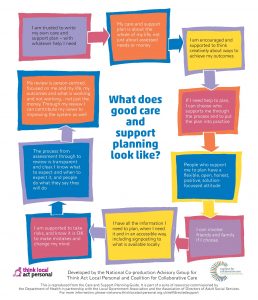Introduction
Personalised care and support planning encourages care professionals and people with long-term conditions and their carers to work together to clarify and understand what is important to that individual. They agree goals, identify support needs, develop and implement action plans, and monitor progress. This is a planned and continuous process, not a one-off event.
Coalition for Collaborative Care, 2014
Care for people with long-term conditions (LTCs) forms a significant part of the health and social care system. There are over 15 million people living with a long-term condition in England. This includes both physical and mental health conditions such as arthritis, asthma, COPD, depression, dementia, diabetes and many more. These are conditions which cannot at present be cured but can be managed or improved through person-centred approaches that deliver the right care for that individual no matter what their condition(s) to ensure that they are involved in managing their condition(s), receive the care they need to live and die well, and that both they and their carers feel supported to maintain a good quality of life. Support might relate to learning new skills, changes in behaviour, access to community support, as well as medication and traditional treatment or therapies.
Personalised care and support planning is a process in which the person with a long-term condition is an active and equal partner.
NHS England
What does good care and support look like?
How can KDC help you to plan your support?
This is what our customers say about KDC's Support Planning service
KDC has been a constant source of support since my son’s discharge. There is no way I would have been able to take control of his health budget, and organise payments. I have way too much going on!
Thank you for all your help for our continuing health care application. If you said you would phone then you did and you have kept us informed all along the way
Thank you for believing as we do that the choices our dad made about his care are important, and for trying to help us fulfil those choices. We know you could not have done more to help.



